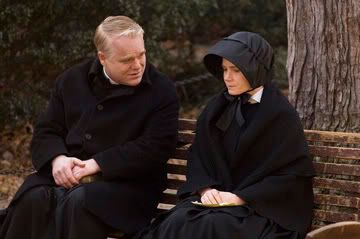Doubt (2008)


This powerful and thought-provoking drama's opening scene shows Father Flynn (Philip Seymour Hoffman) giving a sermon on the subject of doubt. He contemplates the true meaning behind having doubt and its juxtaposition against certainty. This one word, doubt, is what fuels this film that requires to be seen more than once. Walking out of the theater, I already wanted to see it again. It's an intellectually engaging piece that challenges the mind and pins you to your seat. The movie probes the definition of uncertainty and the feelings of isolation and confusion it can bring, therefore forcing viewers to confront their own beliefs and morals.
"Doubt" is, above all, a showcase for its four extremely talented actors who each do Oscar-caliber work. As he shows in the film's initial moments, Hoffman holds a commanding presence and perfectly inhabits a man put up against cruel judgment. He has a deep compassion for standing up for what he believes to be right and fair. He's a confident man but is also hesitant enough to make us second guess him. He is put under a microscope of scrutiny by Sister Aloysius (Meryl Streep). And what really shows Hoffman's expertise as an actor is his ability to stand in a scene with Meryl Streep without slipping behind her bravado. This actress can do anything, and it's no wonder she gets nominated so frequently for her roles. She understands each character she plays, and Sister Aloysius is no exception. Wearing her dark costume as a mask concealing any ounce of compassion, Streep creates a character who is monstrous in her nonnegotiable convictions. Amy Adams, as well, provides a quieter but no less effective role as Sister James who finds herself caught in the middle, not knowing which side is right and wrong.
And then there is Viola Davis who plays Mrs. Miller, the mother of a young black boy enrolled at the Saint Nicholas Church School in the Bronx in 1964. There is a ten minute scene, a conversation between Mrs. Miller and Sister Aloysius, and it is the soul of the movie. While Davis spends the least amount of time on screen, she packs in the most emotional punch. This scene alone makes her extremely worthy of a nomination. It's a wrenching moment, one that unveils startling revelations. Mrs. Miller's son, Donald, has been placed at the center of a fiery dispute between Father Flynn and Sister Aloysius. After Sister James witnesses Father Flynn take Donald into the rectory, she reports the potentially unsavory behavior to Sister Aloysius. While Father Flynn denies any accusations of foul play, Sister Aloysius refuses to back down. From the conversation between Sister Aloysius and Mrs. Miller, we discover that not only is Donald the only black student in an all-white school, but he's also gay. What conclusion can be drawn about the relationship between Father Flynn and Donald Miller?
There's no proof of anything, but as Sister Aloysius states, "I have my certainty." But, as the movie addresses, how far does that take us? The movie is based on the Pulitzer Prize-winning play of the same name by John Patrick Shanley, who also adapted his own screenplay and directed. So, therefore, yes, the movie has the distinct feel of rather than a night out to the movie theater, a night out to an actual theater. This isn't a bad characteristic, however, due to the movie being so strongly fueled by demanding and eloquent writing and stand-out performances. This movie is admirable in the fact that with just simply a great script and great acting alone with no extra frills, it can make for a rousing and dynamic experience.
"Doubt" is brilliant in that it never supplies a clear-cut answer, but rather, offers its audience a chance to look deeper into their own thoughts and opinions, further questioning everything they just witnessed. It creates the full feeling of doubt within not only the minds of its characters but also the mind of its audience. The movie works mostly through subtleties and small details, all wrapped up into a concise but dense piece of filmmaking. We are left contemplating the result of good intentions and how far people are willing to go to satisfy their own beliefs. What does it truly mean to be faithful and to do what is right or moral? There's doubt as to who's the righteous one, and this becomes most troubling especially in a time of certainty. And meanwhile, who's ever really entirely certain of anything? That is the biggest question of all.





No comments:
Post a Comment